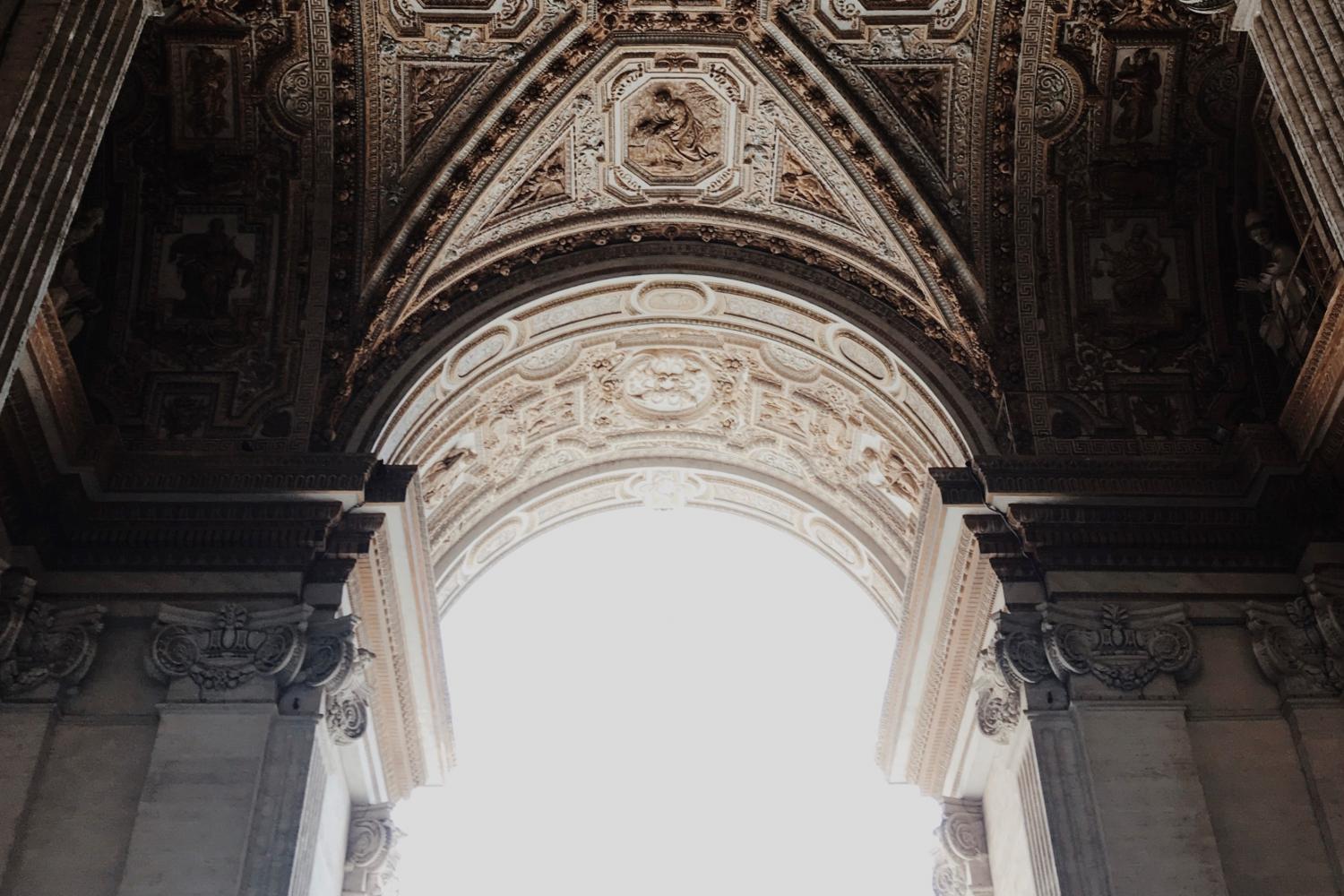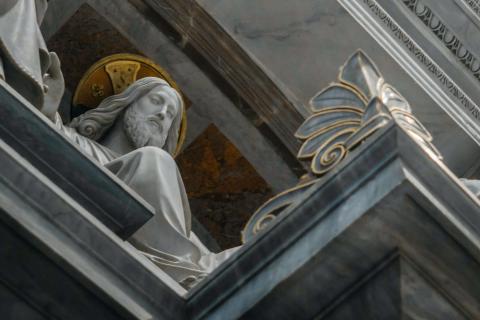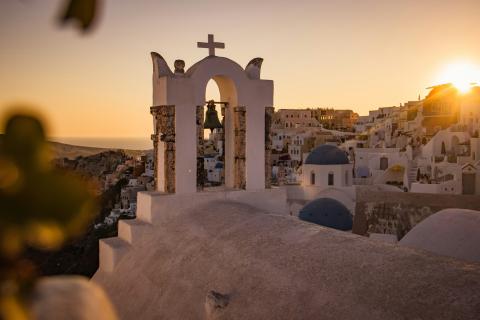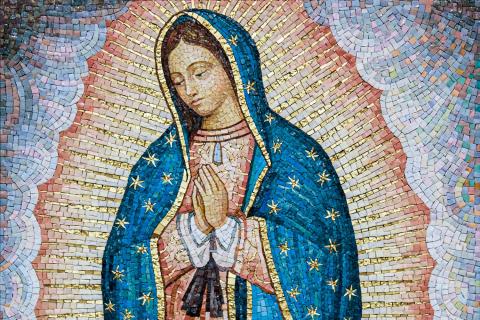
Monsignor James P. Shea delivered the following homily for the funeral Mass of Dr. Don J. Briel, the founder of Catholic Studies, at the Cathedral of Saint Paul the Apostle, St. Paul, Minnesota, on February 20, 2018.
Good brothers and sisters, what a testament to God’s goodness that our friend and mentor – whose vocation was to teach, to prepare his students for a life of service to Christ amid the complexities of the modern world – should be granted the grace that Christ the Teacher should use him to instruct and console us in his dying.
Surrounded by his loving family: his children, his sister, his grandchildren; visited by the companions of his life, including many former students; cared for so tenderly by the Handmaids of the Heart of Jesus (may God reward them) – the way he was given to die beautifully completes all the lessons of a teacher, a disciple, a witness to a tradition and way of life.
He was never really one to suffer fools gladly. Even when you grew close to him, you wanted to be thoughtful about what you said. And so I won’t forget what happened when I last offered Mass for him at his bedside last week. One of the Handmaids came into his study, where we were getting ready, and said: “Just so you know, right when you finish your homily we are going to need to give him morphine.” I asked, politely, if the Sisters could furnish painkillers whenever I preach.
“A great number of men live and die without reflecting at all upon the state of things in which they find themselves.” These are the opening words of The Cross of Christ the Measure of the World, a sermon for Lent by Blessed John Henry Newman. “They take things as they come, and follow their inclinations as far as they have the opportunity. They are guided mainly by pleasure and pain, not by reason, principle, or conscience; and they do not attempt to interpret this world, to determine what it means, or to reduce what they see and feel to system.”
“A great number of men live and die without reflecting at all upon the state of things in which they find themselves.”
This is true of many, but not every man. God grant that it not be true of us. As we remember with sad and grateful affection this remarkable teacher who was so keen to reflect and interpret, as we pray for him and accompany him on his final road, it is fitting, and in keeping with his own wishes, that we should here occupy ourselves with those truths and lessons which he learned from the Master and which he insisted upon so steadily. As he would often ask young faculty as they launched into the academic world, “Are you going to be a student of your life or a victim?”
And so three lessons:
A first lesson: the integrated life.
“Understanding is gray hair for men, and a blameless life is ripe old age” (Wisdom 4:9). The reading from Wisdom speaks in the same breath of “understanding” and “blameless life,” the intellect and the will.
Genuine education promotes an integration of life in which the claims of the intellect find a complimentary formation of virtue. When these are severed from each other a couple of things happen. Knowledge is reduced to either sentiment or power, and the aim shifts from forming the good person to producing the well person. Then those entrusted with the hearts and minds of the young squander all their best energy on concerns of health and safety and regulatory compliance. Education deteriorates from the transformational to the transactional and the therapeutic.
But we who gather round this day are unimpressed by this reduction. We want to grasp the whole of reality, mind and will, and invite young and old into that same vision. And it is not something we make up; we find it woven in a thousand threads in the vast tapestry of Catholic thought and culture. We learn from it, taking it in deeply, and then we pass it on.
This understanding of wisdom means addressing the whole of the person, and the whole of reality in an integrated way. Here we are after not just technical training or barren knowledge, but the formation of the personality: mind, will, emotion, spirit, relationships. Anything less is not real education.
Today we bury a man who was convinced that modern life was caught by the disease of triviality; that we were being taught to think that our lives were of little worth, and that we could be satisfied by arranging a mediocre life with the right comforts and proper signs of success.
But when we try for real education we have in store a breathtaking adventure, not the dry and tedious round of classwork so common, but a way of seeing and knowing that opens up the deepest possibilities of existence and gives meaning and focus to all of life. And as the fog clears we see His face: Christ the Teacher.
Here is the “gaudium de veritate” of St. Augustine, the joy in the truth. Here is the “stupor” or astonishment of mind that Dante speaks of in the Convivio. And how many here today can personally attest to the transformative power of the Christ-centered invitation to true wisdom, to the integrated life?
A second lesson: the battle.
“I am sending you out like sheep into the midst of wolves; so be wise as serpents and innocent as doves” (Matthew 10:16). Service to Christ is necessarily a battle: against self, and against the forces of evil that constantly war against goodness. Life is therefore very good, but not easy; momentous, but costly.
Today we bury a man who was convinced that modern life was caught by the disease of triviality; that we were being taught to think that our lives were of little worth, and that we could be satisfied by arranging a mediocre life with the right comforts and proper signs of success. “Mediocre” was a word often on his lips. But by it he didn’t mean lack of technical excellence. He meant “small-mindedness,” a willingness to be occupied with unworthy pursuits that did not speak of the high destiny of humans. He perceived this in university life when energetic apostolic engagement gave way to fussy bureaucratic rearrangement and prolonged curricular tinkering. This was a wasted choice: a refusal to clamor like champions, to be faithful to a great calling.
He was with Newman who said, “Nothing is so likely to corrupt our hearts, and to seduce us from God, as to surround ourselves with comforts – to have things our own way – to be the center of a sort of world.”
Against this, he constantly insisted on the serious venture of life. “What are you serving?” was his steady question to those around him, especially those who felt burdened. “What are you willing to suffer for?” was his way of focusing the minds of his students and colleagues.
The fruit of this trivialization of life is a deep-seated fear. Because our lives are not founded on the true realities – not deeply grounded in Christ and the Church, the “rock” that could withstand the storms of wind and rain – we find ourselves prey to constant fear lest the fragile construction of our self-generated lives be overwhelmed.
The counter to this fear is courageous engagement. Don’t be afraid. Embrace Christ in all the costly sacrifice that might mean. Don’t hide in a small, protected enclave, seeking only to secure your own commitments. We have universal concerns with the whole of humanity, and so you confront the culture boldly with the truths you have been given. And don’t be surprised when you encounter opposition and difficulty. Nothing worth gaining was ever accomplished without the cross.
When I think of all this, I hear in the distance an old battle cry from Father Richard John Neuhaus, a cry which today rings in my ears as the true voice of the young Catholics of a rising generation: “Spare me a gospel of easy love that makes of my life a thing without consequence!”
And so if our hearts are heavy this day, this lesson is an invitation to rouse them in our chests for gladsome battle. We have the spittle for it.
A final lesson: the invisible world.
“Set your minds on things that are above, not on things that are on earth” (Colossians 3:2). This is after all the fundamental orientation of a man who is able to take death in stride, with such grace and serenity as to convert more deeply those who touch him.
The conviction that life is a thrilling but costly battle is nourished and sustained over the long-haul by a deeper conviction: it means – with Charles Ryder and also all the saints – “to accept the supernatural as the real.”
When one’s life is integrated by a habit of mind to see things in proper relation – like the mind of the poet for T.S. Eliot – forming new wholes and constantly amalgamating different experiences that an ordinary person perceives as chaotic, irregular, fragmentary: falling in love, reading Spinoza, the sound of a typewriter, the smell of cooking… when all these begin to mean something taken together then you begin to suspect that there is a conspiracy afoot, that there is actually a mystery that runs underneath all things.
In the face of such a mystery, admiration is not enough. We must stand with Rilke before the Apollo Belvedere in the Vatican Museums and know this: “You must change your life.”
Education is then not the renewal of the intelligence but of the imagination. It means a profound conversion and a fierce allegiance to the invisible world.
This allegiance, which is Christian faith, translated for our man in very practical ways. He was much taken by the story of final words said to a Holy Cross priest at Notre Dame by a dying friend: “We can live our lives either out of gratitude or resentment – there is no middle ground.”
The excuse so many give for not leading a meaningful life is scarcity: I don't have enough time, security, talent, resources. And this scarcity is experienced as a burden, a cruel injustice to be resented. The demand is always for justice, getting what should be coming to me. And it's never enough. I begin to undergo life rather than live it.
But this is a fundamentally anti-Christian attitude, it is a defect of faith. For the true question is not one of scarcity but of abundance. How does one navigate the astonishing range of what one has been given but could never deserve? Time is only too short to take in all the wonder and opportunity and possibility of life. What does one do with this overabundance, this unlooked-for gift of life from Christ? Where is the adequate response?
Education is then not the renewal of the intelligence but of the imagination. It means a profound conversion and a fierce allegiance to the invisible world.
A child who makes a Christmas list and gets everything she wants experiences a profound, mysterious disappointment. But if she is given a gift which she didn't ask for, which indeed she didn't know that she wanted, there is a kind of profound enjoyment and delight. How can we then prepare our lives for the gifts which we didn't know we wanted, but for which we are longing so deeply? It is a matter of learning, habitually, how to receive our lives.
And then he would say this, words I have run through my memory again and again during this past month:
As I finish, I would just mention a few more things.
He loved the Church, not as an ideal, but as it really was. Always Catholic Studies was an ecclesial work. It was not his work but our work, the work of a communion of scholars, God’s work. And the mind is most creative not when it is undisturbed by authority, but in active engagement with it. Only the obedient believe. He loved the Church, “priestcraft” and all.
It is a spiritual principle that in certain lives, lived for Christ, especially if they encounter a good deal of opposition, the true flourishing comes afterward, after they have died. We see this in the lives of prophets and saints, we see it in the life of the Master: “Very truly I tell you, whoever believes in me will do the works I have been doing, and they will do even greater things than these” (John 14:12).
And so we should be alert now to notice what happens next.
To his family: how will you now excel him? All together and one by one, in your fidelity, in your love for each other and the charity of your daily lives, what are you now called to from what you have seen and heard? Last summer I heard him tell a room full of priests, “There is no reason any of us should not have the holiness of the Apostles. It is no great heroism, it is the doing of small things well.”
And for those of us who carry forward the work of integral education and Catholic Studies, we should buckle our seat belts.
Do you remember how Newman put it in the Idea of a University?:
In the spring of 2014, the father of a program and a movement spoke for the last time to a group of graduating seniors from Sitzmann Hall. He noted to them, to situate their memory of their experience in Catholic Studies, the English titles of a pair of memoirs by Raissa Maritain: Adventures in Grace and We Have Been Friends Together.
Adventures in Grace: Catholic Studies was a great surprise to him, never experienced as something he had done but rather something he had been given to do. It was a profound adventure, deeper and deeper into God. All of the Christian life is this way, for those who say yes.
We Have Been Friends Together: On September 25, 1843, John Henry Newman preached his final sermon at St. Mary and St. Nicholas, the church he had built in Littlemore. It was a painful farewell, and they all could have used the Handmaids to come round with their morphine. He titled that sermon The Parting of Friends, and it ends this way:

In the Likeness of Christ
Dr. Don J. Briel
To imitate Christ is to put on the mind of Christ, imitating his interior dispositions and grasping the broad principles by which he worked out his life's task.


